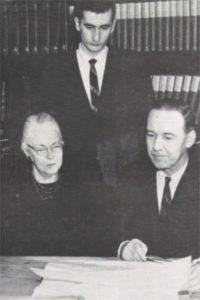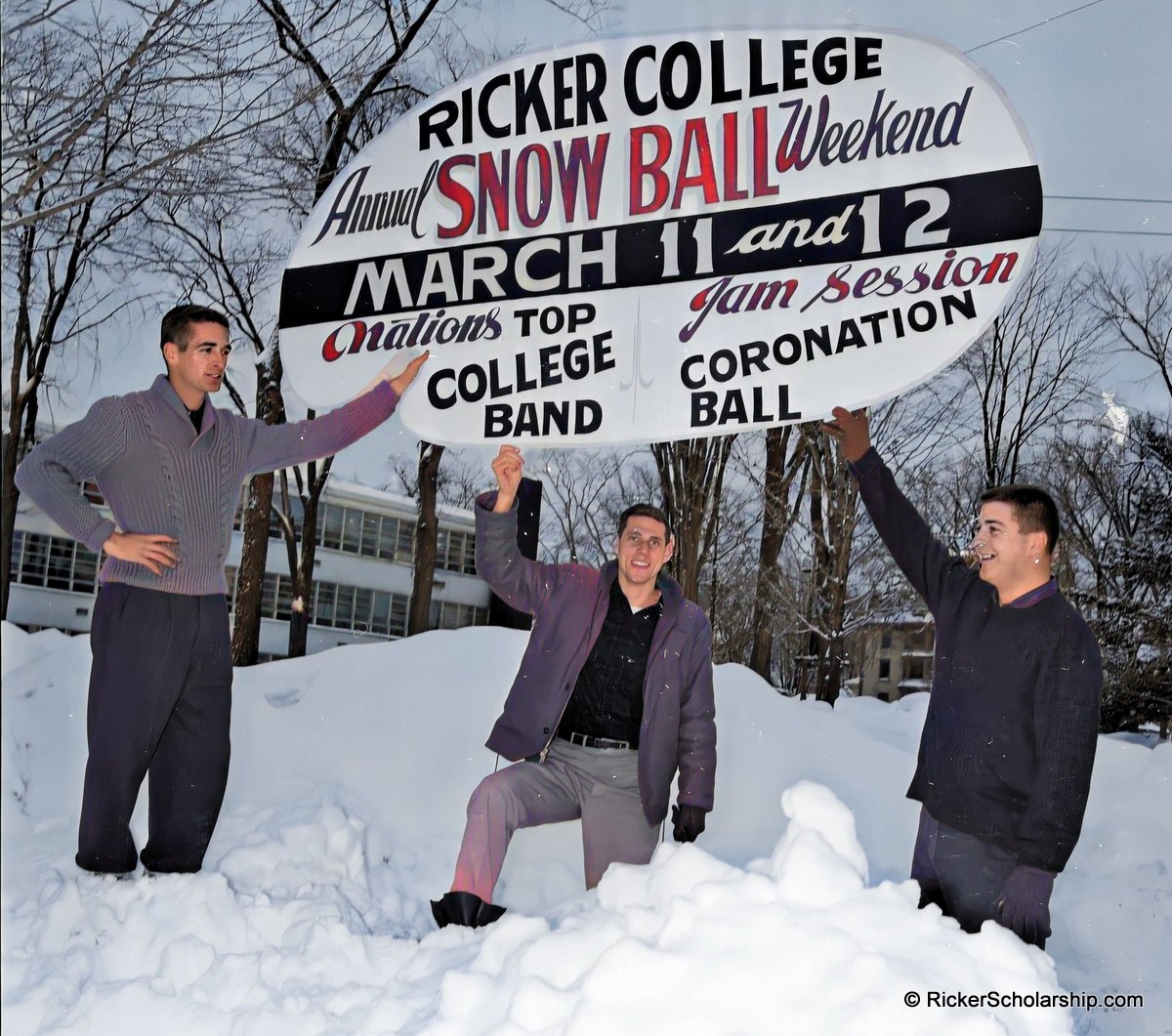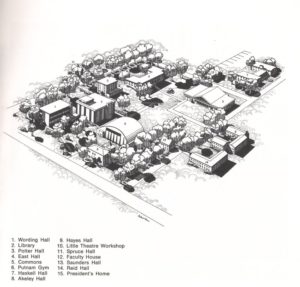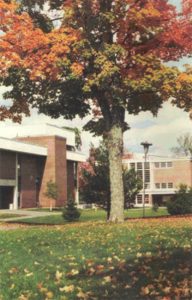RICKER COLLEGE: A Small School in A Big County
by Bruce Wright
A Bit of Ricker College History
For those who would like to know more about our Scholarship fund, and the school for which it is named, we offer this article, reprinted from the February 2007 edition of Memories of Maine
“We live as long as we are remembered. ”
This quotation of unknown origin is true of Dr. Joseph Ricker. D.D., who became a savior of’ the small school in the big county that would bear his name: Ricker Junior College in Houlton. It is also true of Ricker College and the Ricker Scholarship Fund carried on by school trustees that awards $157,000 annually to college bound students 28 years after the college was forced to close!
Catherine Bell of the town’s Hope Museum, which has a Ricker Room with many school mementos, has two daughters who are Ricker College graduates. Mrs. Bell points out that several of the Houlton school graduates made their mark in government and the arts. Conrad Cyr was a federal judge. John Pullen, who graduated in about 1928, wrote several books including The 20th Maine which is about the famous Maine Civil War regiment. Daniel Wathan was Chief Justice, Maine Supreme Court, and Elmer Violette also served on the State Supreme Court.
Sen. Mark Hatfield of Oregon was the commencement speaker in 1967, and Bruce Springsteen performed at the 1973 Ricker Snowball Weekend. Arthur Smith, father of Samantha Smith, the young girl who made national headlines when she visited Russia, was a Ricker instructor. These are just a few names associated with Ricker College.
Dr. Ricker believed in hard work, and he saw it through the years at the Aroostook County college. He worked his way as a teacher while earning his divinity degree at Waterville College, a Baptist school.
On a visit to the county, Dr. Ricker heard about the forced closing in 1873-74 of what was then Houlton Academy. The school lacked the finances to continue after the State Legislature passed a law that required all Maine high schools to be public schools free of tuition charges. He wanted to help the little school in “The County.” Even while Ricker was closed, somehow Miss Mattie C. Hall managed to teach a class of three pupils! This perseverance and persistence were hallmarks of Ricker College over the years. It’s fighting spirit caried the school through many obstacles and problems.
Dr Ricker, born in York County, believed Ricker could survive and thrive as a fitting school for Colby College where students would receive a Christian college education. This alliance, by deeding the Houlton property in trust to Colby, gave the Academy Colby’s financial aid of $31,375.95 and enabled it to continue. It became the Eastern Preparatory School for Colby.
The college had many names and reincarnations during it’s 130 years. Founded in Houlton in 1848 as Aroostook County’s first secondary school, it was originally named Houlton Academy. The school was established to provide better schooling for the town that had only one grade in a single room at a private house. If no teacher was available, there was no school.
In 1848 eight trustees asked the State Legislature for help to form the new school, Houlton Academy. They were granted “a half township of land” in “Township 14, Range 3, now Woodland, if they erected a building and showed a $1,000 reserve by October 1849.
Trustees met the requirements a year early, and Houlton Academy began classes in the fall of’ 1848 with Milton Welch as principal at S200 a year. The next year trustees set tuition at $2 a term.
Houlton Academy, later named Ricker, represented the only college preparatory school available for Aroostook County students for forty years. As a 1960s alumnus explained, “Traveling was the big reason for Ricker’s success.” The presence of a good preparatory school, later declared a junior college, in Aroostook County eased or eliminated travel time and expense for area students. By 1886 the Academy’s three person faculty offered courses in English, Latin, arithmetic, and history. That same year, twelve years after Dr. Ricker’s involvement in Houlton Academy, Mrs. Catherine Wording of Grand Forks, North Dakota donated $30,000 to the school to build a classroom which was named Wording Hall in her honor. Her mission was to provide funds to help small schools survive and prosper.
The Academy was officially named for Dr. Ricker in 1887.
In 1889 or 1899 (sources differ on the date), the Maine Legislature again came to the struggling school’s aid with a $1,000 grant for ten years. This enabled Ricker Classical Institute to add more courses and expand its athletic program.
The Institute had gradually improved its image and status by 1926 when it had 130 students and a faculty of eight teachers. Trustees increased the scope and number of courses. They provided a one year college program for a few students, a third of whom continued their education at Colby College.
A sizeable gift in 1928 from E.G. Haskell, and the acquiring of the Gellerson property on Heywood Street enabled the Houlton school to build a girls’ dormitory. In 1938 the legislature approved Ricker Junior College as a school qualified to grant associate degrees in arts and science.
A crippling set-back struck the growing college on March 30 1944 when a fire completely demolished Wording Hall. The fire destroyed irreplaceable historical records and items. Post-fire problems sent teachers scur¬rying to conduct classes any place in town where they could find space: churches, lodges and at the airbase. They taught their classes beginning the day after the fire.
Feisty little Ricker fought back. School alumni, Aroostook County, the State Legislature and Houlton area residents contributed generously and worked together to bring Ricker Junior College back from the ashes of the devastating fire. A new Wording Hall was dedicated August 29. 1946. However, the school lacked a much needed gymnasium. Ricker alumnus Fred Putnam spearheaded trustees to write a $154,000 grant proposal for a new gym under a federal program to aid World War 11 veterans returning to college. The grant was approved. A Quonset-style building named Putnam Gymnasium, was completed in April 1948.
Ricker Junior College achieved its ultimate educational goal in 1949 when it was chartered as a four year liberal arts college. By 1950 the college had several well-equipped classrooms, three dormitories, a gymnasium, and a growing library. With an enrollment increase in 1960-61, Ricker again expanded by buying property in town for another men’s dormitory. Ricker also remodeled an old dorm into a cafeteria, administrative offices and seminar rooms.
Then in 1966 Ricker College faced another difficult problem. The State required Houlton and all other Maine communities to become school districts. This meant the college would need to draw students from outside the Houlton area, a very difficult, perhaps impossible task, for the small school.
Ricker closed officially in 1978 but its Board of’ Trustees remains active with a successful and generous college scholarship program. It is well supported by alumni, businesses, townspeople and grants. By the year 2000, trustees had a million dollars in scholarship aid for the youth of Aroostook and Washington Counties. Gary B. Bossie, executive director of the Ricker Scholarship Funds, said some 35-40 college-bound students from these counties annually receive this financial aid.
“Students in good standing may have their scholarship renewed each year of college,” he explained. “I will be writing 131 checks to various colleges throughout the United States beginning in January.” The scholarships were increased two years ago from $1,000 annually to $1,500 per year.
The board has given a total of more than $2,800,000.00 in scholarship aid since its inception in 1985, a remarkable amount for a small northern Maine School, but it’s not surprising for such a solid educational institution as Ricker that has earned the wholehearted support in every way of alumni and friends.
Yes, the Ricker name is alive and well in the Houlton area with the Ricker Room at the local Museum filled with school mementos, in a generous ongoing scholarship fund, and in the hearts of alumni and town residents who remember fondly the small feisty school in the big Maine County.





